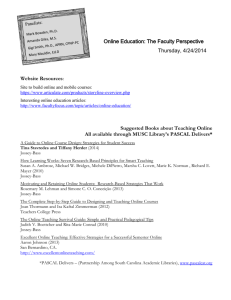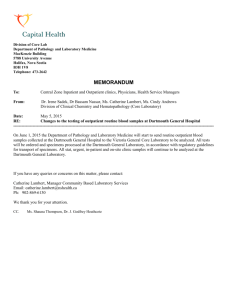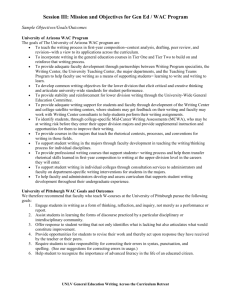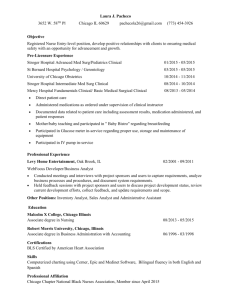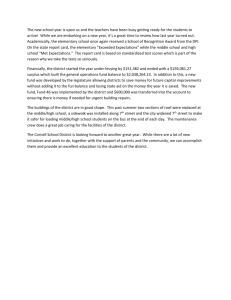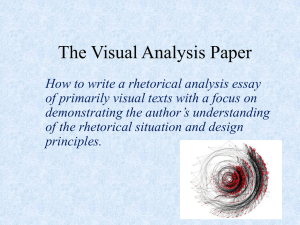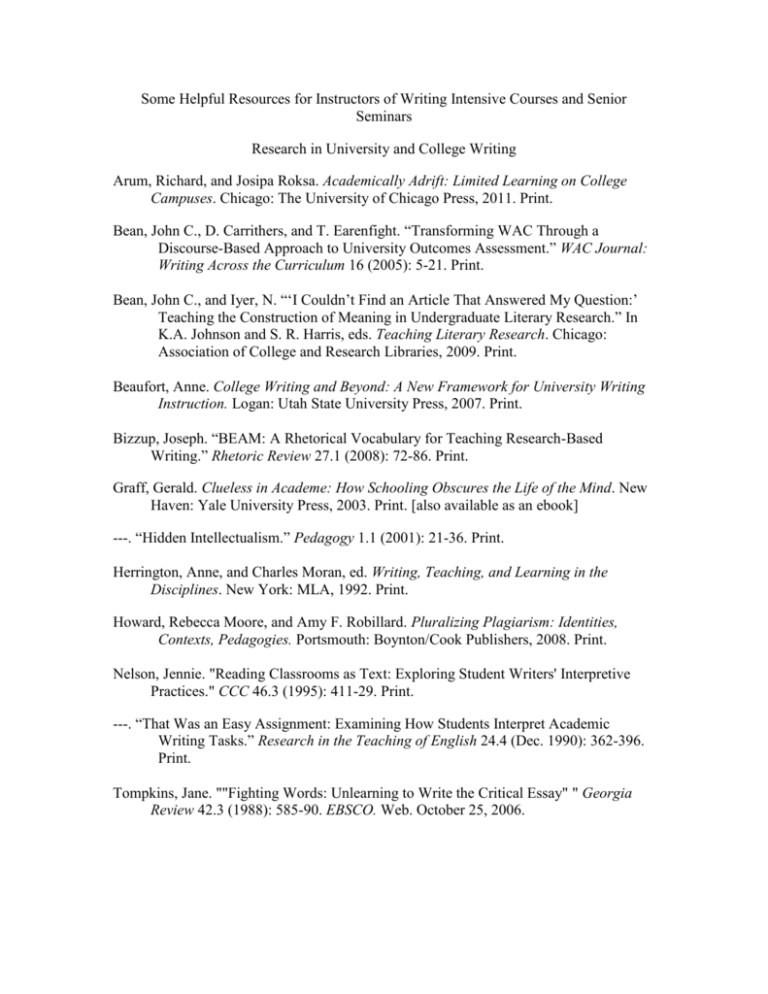
Some Helpful Resources for Instructors of Writing Intensive Courses and Senior
Seminars
Research in University and College Writing
Arum, Richard, and Josipa Roksa. Academically Adrift: Limited Learning on College
Campuses. Chicago: The University of Chicago Press, 2011. Print.
Bean, John C., D. Carrithers, and T. Earenfight. “Transforming WAC Through a
Discourse-Based Approach to University Outcomes Assessment.” WAC Journal:
Writing Across the Curriculum 16 (2005): 5-21. Print.
Bean, John C., and Iyer, N. “‘I Couldn’t Find an Article That Answered My Question:’
Teaching the Construction of Meaning in Undergraduate Literary Research.” In
K.A. Johnson and S. R. Harris, eds. Teaching Literary Research. Chicago:
Association of College and Research Libraries, 2009. Print.
Beaufort, Anne. College Writing and Beyond: A New Framework for University Writing
Instruction. Logan: Utah State University Press, 2007. Print.
Bizzup, Joseph. “BEAM: A Rhetorical Vocabulary for Teaching Research-Based
Writing.” Rhetoric Review 27.1 (2008): 72-86. Print.
Graff, Gerald. Clueless in Academe: How Schooling Obscures the Life of the Mind. New
Haven: Yale University Press, 2003. Print. [also available as an ebook]
---. “Hidden Intellectualism.” Pedagogy 1.1 (2001): 21-36. Print.
Herrington, Anne, and Charles Moran, ed. Writing, Teaching, and Learning in the
Disciplines. New York: MLA, 1992. Print.
Howard, Rebecca Moore, and Amy F. Robillard. Pluralizing Plagiarism: Identities,
Contexts, Pedagogies. Portsmouth: Boynton/Cook Publishers, 2008. Print.
Nelson, Jennie. "Reading Classrooms as Text: Exploring Student Writers' Interpretive
Practices." CCC 46.3 (1995): 411-29. Print.
---. “That Was an Easy Assignment: Examining How Students Interpret Academic
Writing Tasks.” Research in the Teaching of English 24.4 (Dec. 1990): 362-396.
Print.
Tompkins, Jane. ""Fighting Words: Unlearning to Write the Critical Essay" " Georgia
Review 42.3 (1988): 585-90. EBSCO. Web. October 25, 2006.
Books Designed to Help Instructors
Bean, John C. Engaging Ideas: The Professor’s Guide to Integrating Writing, Critical
Thinking, and Active Learning in the Classroom. Foreward Maryellen Weimer.
2nd Ed. San Francisco: Jossey-Bass/Wiley, 2011. Print.
Blau, Sheridan D. The Literature Workshop: Teaching Texts and their Readers.
Portsmouth, NH: Heinemann, 2003. Print.
Hauhart, Robert C., and Jon E. Grahe. Designing and Teaching Undergraduate Capstone
Courses. San Francisco: Jossey-Bass/Wiley, 2015. Print. [available January 2105]
Walvoord, Barbara, and V. Anderson. Effective Grading: A Tool for Learning and
Assessment. 2nd. Ed. San Francisco: Jossey-Bass/Wiley, 2009. Print.
Young, Art. Teaching Writing Across the Curriculum. 4th ed. Upper Saddle River, NJ:
Pearson Prentice Hall, 2006. Print. Also available open access at
http://wac.colostate.edu/books/young_teaching/
Student Textbooks
I am not suggesting that you need to assign a student handbook, other than MLA 7th ed.,
although of course you might want to. But I have found student guides very helpful in
crafting assignments, partly because they give me the language in which to frame them.
Acheson, Katherine O. Writing Essays About Literature: A Brief Guide for University
and College Students. Peterborough: Broadview Press, 2010. Print.
Ballenger, Bruce. The Curious Researcher: A Guide to Writing Research Papers. 8th ed.
New York: Longman, 2014. Print. [I am familiar with the 7th edition, which I
really like; Rhonda has copies in the office]
Booth, Wayne C., Gregory G. Colomb, and Joseph M. Williams. The Craft of Research.
3rd Edition. Chicago: The University of Chicago Press, 2008.
Graff, Gerald, and Cathy Birkenstein. They Say/I Say: The Moves that Matter in
Academic Writing. 3rd Edition. New York: W.W. Norton, 2014. Print.
Kolln, Martha. Rhetorical Grammar: Grammatical Choices, Rhetorical Effects. 7th Ed.
New York: Longman, 2012. Print.
Rosenwasser, David, and Jill Stephen. Writing Analytically. 7th Ed. Stamford, CT.:
Cengage, 2015. Print.
Online Resources
Provided by Dr. Laura McGrath, as used in her Senior Seminar
Dartmouth Institute for Writing and Rhetoric
“Logic and Argument” http://writing-speech.dartmouth.edu/learning/materialsfirst-year-writers/logic-and-argument
“Attending to Grammar” (includes “Most Commonly Occurring Errors”)
http://writing-speech.dartmouth.edu/learning/materials-first-yearwriters/attending-grammar
“Revision: Cultivating a Critical Eye” http://writingspeech.dartmouth.edu/learning/materials/materials-first-year-writers/revisioncultivating-critical-eye
Harvard Guide to Using Sources
http://usingsources.fas.harvard.edu/icb/icb.do
Purdue OWL, “Writing a Research Paper”
https://owl.english.purdue.edu/owl/owlprint/658/
University of Illinois at Urbana-Champaign Center for Writing Studies, “Writing Tips:
Thesis Statements”
http://www.cws.illinois.edu/workshop/writers/tips/thesis/
University of North Carolina at Chapel Hill, “Argument”
http://writingcenter.unc.edu/handouts/argument/
Writing Commons, “Supporting Ideas and Building Arguments”
http://writingcommons.org/open-text/genres/public-speaking/supporting-ideas-buildingarguments
Writing@CSU, “Writing Arguments”
http://writing.colostate.edu/guides/index.cfm?categoryid=4&title=1

